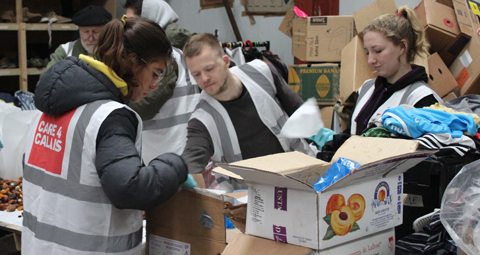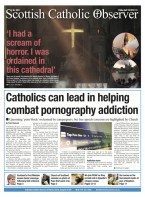BY Ryan McDougall | February 15 2019 | ![]() 0 COMMENTS
0 COMMENTS ![]() print
print

Faith on the frontlines in the battle to help Europe’s refugees
Publication Date: 2019-02-15
Migrants in France and Belgium tell Church reps they are praying the UK will give them safe harbour
Refugees in France and Belgium have spoken of their struggle to find safe harbour amid poverty and police brutality, as the Church in Scotland helped provide them with aid last week.
In 2016, a makeshift community of refugees in Calais, France, known as ‘The Jungle’ was demolished. Media coverage of the refugees’ plight subsequently dissipated, but thousands remain in desperate conditions, living in the woods and on streets, hoping to make a better life in the UK.
In two trips over 14 days in January and February, Justice and Peace Scotland, a commission of the Bishops’ Conference of Scotland, volunteered to help Care 4 Calais, an aid organisation that assists refugees in Belgium and France.
During the visit, refugees stated how they are met with hostility from French police forces.
One Kurdish man, Oras, lives in the woods of Dunkirk. He said he and his friends’ tents were slashed open by police despite freezing temperatures and his phone was smashed while they were being moved on.
“The police here are worse than any of the other places I’ve been,” he said.
Prayers
Another man, Shorsh, 35, who fled Iraq to be with his daughter in the UK, claimed he had been arrested by police the day before speaking with the SCO, on suspicion of being a smuggler, which he denied.
Shorsh said: “Yesterday the police caught me in this park. They caught me and they treated me like a terrorist.
“They put me in a cell and they made me naked, took all my clothes off and they put me in a cell with other guys all night—no blanket, no nothing.
“They took my DNA, they took my fingerprints, and they made me a criminal, saying I smuggle people to the UK.
“I’m praying the people open the gate to let me into the UK.”
Care 4 Calais provide hundreds of refugees with food and clothing to combat hunger and freezing temperatures, and offer hair cuts and power stations where they can charge their phones, which are often the refugees’ only means of contacting their loved ones in other parts of the world.
Jessica Krause, a Care 4 Calais operations manager, said this is not only to provide the ‘basic needs’ of the refugees, but also to preserve their dignity.
She added that in her six months of employment with Care 4 Calais, she has seen little-to-no media coverage about the plight of the refugees. She added that those seeking safety are rarely referred to as ‘asylum seekers’ but instead as ‘illegal immigrants.’
Difficult case
In nearby Brussels, Belgium, the refugees are predominantly from African countries such as Eritrea and Sudan.
During the day, they seek shelter in Gare de Bruxelles-Nord train station, and move to the nearby Maximillian Park to receive aid from the various charities who offer help.
The refugees live on the streets at night after the station closes.
In September 2018, Refugee Rights Europe reported that out of a sample of 118 refugees living in Brussels, 94 per cent were sleeping on the streets.
Attitudes in Belgium towards refugees are mixed.
Andrew Quinn, a Scottish man who moved to Brussels almost six years ago to be with his Belgian wife, said he is supportive of refugees, and that they ‘add to the diversity of Belgium.’
He added: “I won’t try and paint a picture of 100 per cent acceptance as it is not the case for a small minority. I’ve even been subject to a few racist comments in my nearly six years here but those I can count on one hand.”
Clare Moseley, founder of Care 4 Calais, said attitudes in France are similar.
The Holy Spirit
At the end of their trip, the Justice and Peace team reflected on their visit.
Br Antony Connelly, a Passionist from St Mungo’s in Glasgow who volunteered with the Justice and Peace team, said: “It’s been overwhelmingly sad to be spending this short time with these men, and then just to see them walk away off into the distance, going home to slashed tents.”
He said the refugees were ‘amazing people,’ ‘resourceful’ and community oriented.
“As I’ve said before, the Spirit was clearly present here,” he said.
Justice and Peace’s Danny Sweeney and Frances Gallagher represented the Church on the trip. Ms Gallagher said: “Spending time in Calais with destitute refugees has made me realise that we can no longer remain silent to the UK arms trade.
“We must redouble our efforts to lobby our political leaders to end the selling of bombs which keep conflicts going, in turn forcing people like those we encountered over the last few days to flee in search of safety.”
Care 4 Calais founder Clare Moseley said Justice and Peace Scotland and other volunteers were essential to their work. “We couldn’t do it without them—we simply couldn’t exist without them,” she said.
She also called on the UK government to offer more assistance to help immigrants integrate in the UK, which in turn could increase the number of people who support refugees coming to the country.
“Imagine if that campaign had happened and the public had been bolstered to do something good,” she said.
“There are hard times in the UK right now, but do you know what? We could make something good and powerful and make people feel good about themselves, instead of something that has divided Britain in half, with hate.”
“We could make something that joined us together.
“There’s so much that could have been done differently and still could be done differently.”










